A Few Brief Reports and Opinions.
Page 17
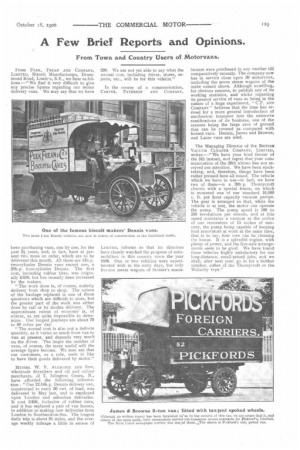
Page 18
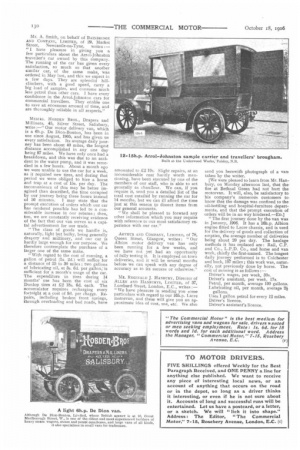
Page 19
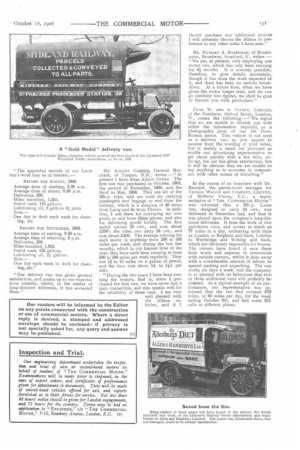
Page 20
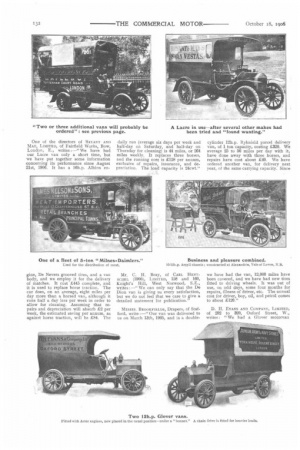
Page 21
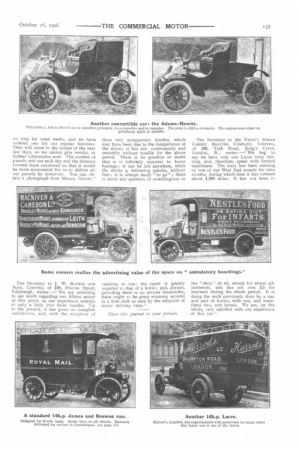
Page 22
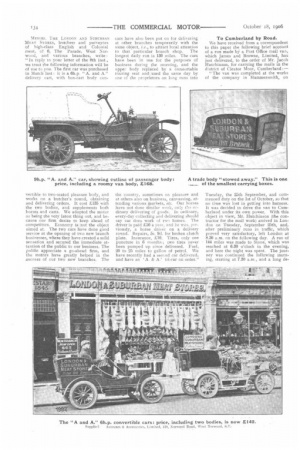
Page 23
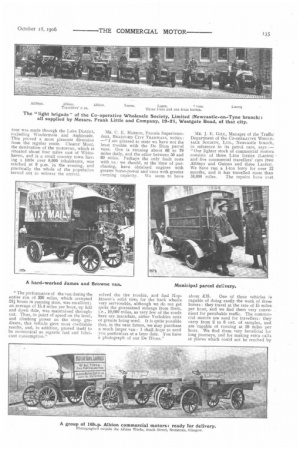
Page 24
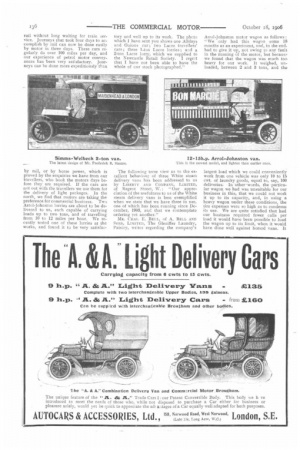
Page 25
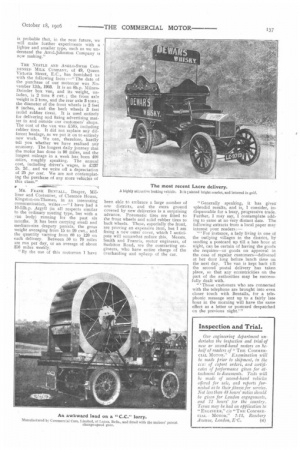
Page 26
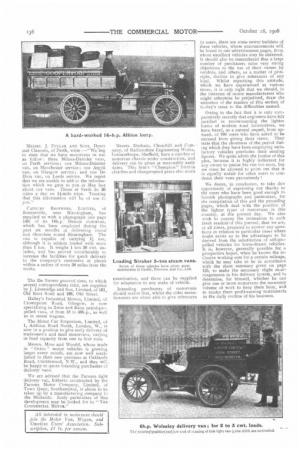
If you've noticed an error in this article please click here to report it so we can fix it.
From Town and Country Users of Motorvans.
From PEEK, FREAK AND COMPANY, LIMITED, Biscuit Manufactureirs, Drummond Road, London, S.E., we hear as follows :—" We find it very difficult to give any precise figures regarding our motor delivery vans. We may say that we have been purchasing vans, one by one, for the Past 2i years, and, in fact, have at present two more on order, which are to be delivered this month. All these are 14h.p. two-cylinder Dennis vans except one, A 20h.p, four-cylinder Dennis. The first cost, including rubber tires, was originally £450, but has recently been increased by the makers.
"The work done is, of course, entirely delivery from shop to shop. The nature of the haulage replaced is one of those questions which are difficult to state, hut the greater part of the work was either done by rail or by double delivery. The approximate extent of economy is, of course, as yet quite impossible to determine. Our longest journeys are about 70 to 80 miles per day.
"The annual cost is also not a definite quantity, as it varies so much from van to van at present, and depends very much on the driver. The larger the number of vans, of course, the more useful will the average figure become. We may say that our customers, as a rule, seem to like to have their goods delivered by motor."
MESSRS. W. V. ALLRIDGE AND SON, wholesale drysalters and oil and colour merchants, of 7, Islington Green, N., have afforded the following information : "Our 12-14h.p. Dennis delivery van, constructed to carry 30 cwt. of load, was delivered in May last, and is employed upon London and suburban deliveries. It cost £450, inclusive of rubber tires, and it has replaced a pair of van horses, in addition to making new deliveries from London to Southend-on-Sea. The longest daily trip is about 85 miles, and the average weekly mileage a little in excess of
200. We are not yet able to say what the annual cost, including driver, stores, repairs, etc., will be for this vehicle."
In the course of a communication, CARTER, PATERSON ANT) COMPANY, LIMITED, informs us that its directors have closely watched the progress of automobilism in this country since the year 18E16. One or two vehicles were experimented with in thc early days, but only five-ton steam wagons of Straker's manu facture were purchased in any number till comparatively recently. The company now has in service close upon 30 motorvans, including the seven steam wagons of the make named above. Although unwilling, for obvious reasons, to publish any of its working statistics, and whilst regarding its present service of vans as being in the nature of a huge experiment, " C.P. AND COMPANY" believes that the time has arrived for a more general introduction of mechanical transport into the extensive ramifications of its business, one of the reasons being the large area of ground that can be covered as compared with horsed vans. Dennis, James and Browne, and Lacre vans are used.
The Managing Director of the Barrisit VACUUM. CLEANER COMPANY, LIMITED, writes :—" We have your kind favour of the 5th instant, and regret that your communication of the 29th ultimo has not received our attention. We have been stocktaking, and, therefore, things have been rather pressed here all round. The vehicle which we have in use—in fact, we have two of them—is a 20h p. Thornycroft chassis with a special frame, on which is mounted one of our standard 10,000 c. ft. per hour capacity vacuum pumps. The gear is arranged so that, while the vehicle is at rest, the motor can operate the pump. The pump speed is 180 to 200 revolutions per minute, and at this speed maintains a vacuum at the orifice of our renovators of 15 inches of mercury, the pump being capable of keeping four renovators at work at the same time, that is to say, four men can be cleaning the house. It is a splendid engine, with plenty of power, and the live-axle arrangements seem to be good. We have found these vehicles highly satisfactory for our long-distance, small-priced jobs, and we shall, after next year. go in for a further number, either of the Thornycroft or the Wolseley type."
Mr. A. Smith, on behalf of BAINBRIDGE AND COMPANY, LIMITED, Of 29, Market Street, Newcastle-on-Tyne, writes :— "I have pleasure in giving you a few particulars about the .Arrol-Johnston traveller's car owned by this company. The running of the car has given every satisfaction, so much so that another similar car, of the same make, was ordered in May last, and this we expect in a few days. They are splendid hill. climbers, with a good speed, carry a big load of samples, and consume much less petrol than other cars. I have every confidence in the Arrol-Johnston cars for commercial travellers. They enable one to save an enormous amount of time, and are thoroughly reliable in all respects."
MESSRS. HOBDEN BROS., Drapers and Milliners, 45, Silver Street, Salisbury, write :—" Our motor delivery van, which is a 6h.p. De Dion-Bouton, has been in use since August, 1905, and has given us every satisfaction. Its average daily journey has been about 40 miles, the longest distance accomplished in any one day being 97 miles. We have only once had a breakdown, and this was due to an accident to the water pump, and it was remedied in a few hours. About a month ago we were unable to use the car for a week, as it required new tires, and during that period we were obliged to hire a horse and trap at a cost of 15s. per day. The inconvenience of this may be better imagined than described, the time occupied by our journey being three hours instead
of 50 minutes, I may state that the prompt execution of orders which our car has rendered possible has led to a considerable increase in our returns ; then, too, we are constantly receiving evidence of the fact that our van serves as a capital advertisement for our trade.
"The class of goods we handle is, naturally, light but bulky, being generally drapery and millinery, and our car is hardly large enough for our purpose. We therefore contemplate the purchase of a larger one of the same make.
"With regard to the cost of running, a gallon of petrol (Is. 2d.) will suffice for a distance of 25 to 30 miles ; two gallons of lubricating oil, at 3s. 6d. per gallon,' is sufficient for a month's usage of the car. The expenditure in tires during 14 months' use has been the cost of six Dunlop tires at £2 18s. 6d. each. The accumulator requires recharging every fortnight at a cost of 9d. per charge. Repairs, including broken front springs, through overloading and bad roads, have amounted to £2 10s. Slight repairs, at an inconsiderable cost hardly worth mentioning, have been executed by one of the members of our staff, who is able to act generally as chauffeur, We can, if you require it, send you a detailed list of the total cost entailed by running the car for 14 months, but we can ill afford the time just at this season to dissect items from our general accounts.
"We shall be pleased to forward any other information which you may require with reference to our most satisfactory experience with our car."
ARTHUR AND COMPANY, LIMITED, of 7, Queen Street, Glasgow, writes : "Our Albion motor delivery van has only been running for a few weeks, and we have not yet had an opportunity of fully testing it. It is employed on town deliveries, and it will be several months before we can speak with any degree of accuracy as to its success or otherwise."
MR. REGINALD J. HANBURY, Director of ALLEN AND HANBURYS, LIMITED, of 37, Lombard Street, London, E.C., writes :— "We have pleasure in sending you some particulars with regard to our 1611.p. Lacre motorvan, and these will give you an approximate idea of cost, use, etc. We also send you herewith photograph of a van taken by the writer.
[We were pleased to learn from Mr. Hanbury, on Monday, afternoon last, that thefire at Bethnal Green had not hurt the motorvan. It will, also, be satisfactory to. his company's numerous customers to, know that the damage was confined to the oil-bottling and hospital-furniture departments, and that the prompt execution of orders will be in no way hindered.—Eb.1
"The first journey done by the van was in January, 1906. It has a 16h.p. Albion engine fitted to Lacre chassis, and is used for the delivery of goods and collection of empties, the average number of deliveries being about 20 per day. The haulage methods it has replaced are : Rail, C.P. and Co., L.P.D. Co., and horse and van work, chiefly the first-named. The longest daily journey performed is to Colchester and back, 107 miles ; this work was, naturally, not previously done by horse. The cost of running is as follows :— Driver's wages, per week, 30s.
Driver's assistant, per week, 17s. Petrol, per month, average 100 gallons. Lubricating oil, per month, average 24
gallons. Uses 1 gallon petrol for every /2 miles. Driver's licence.
Driver's assistant's licence. "The appended records of our Lacre van's work may be of interest :—
RECORD FOR AUGUST, 1906. Average time of starting, 9.30 a.m. Average time of return, 8.30 p.m. Deliveries, 339.
Miles travelled, 1,355. Petrol used, 110 gallons.
Lubricating oil, 2 gallons 6i pints Note.—
One day in dock each week for cleaning, etc.
REcoRn FOR SEPTEMBER, 1906. Average time of starting, 9.30 a.m. Average time of returning, 9 p.m. Deliveries, 880.
Miles travelled, 1,352. Petrol used, 123 gallons. Lubricating oil, 2, gallons.
Note.— One day each week in dock for cleaning, etc."
"Our delivery van has given general satisfaction, and comes up to our expectations entirely, whilst, in the matter of long-distance deliveries, it has exceeded them." MR. ROH ERT GARDEN, General Merchant, of Tongue, N.B., writes : —" At present I have three Albion lorries. The first one was purchased in October, 1904, the second in November, 1905, and the third in May, 1906. They are all of the 16h.p. type, and are used for carrying passengers and luggage to and from the railway, which is a distance of 40 miles from Lairg and 43 from Thurso. In addition, I use them for conveying my own goods to and from these places, and also for delivering goods locally. The first motor carries 20 cwt., and cost about £390; the other two carry 24 cwt., and cost about £420. The average running for each motor is anything from 200 to 500 miles per week, and during the last few months, which is our busiest time of the year, they have each been running at least 400 to 500 miles per week regularly. They run 12 to 15 miles on a gallon of petrol, and the tires cost about id. to lid. per mile.
"During the two years I have been running the motors, that is, since I purchased the first one, we have never lost a train connection, and this speaks well for the reliability of these cars. I am very well pleased with the Albion vehicles, and if I
should purchase any additional motors]. will certainly choose the Albion in preference to any other make I have seen."
MR. RICHARD A. BOARDMAN, of BOARDMANS, Broadway, Stratford, E., writes:— " We are, at present, only employing one motor van, which has only been running for 44 months. It is scarcely possible, therefore, to give details accurately, though it has done the work expected of it, and there has been no serious breakdown. At a future time, when we have given the motor longer trial, and we can go carefully into figures, we shall be glad to furnish you with particulars."
From W. AND A. Go. Ft I,: V., LIMITED,. of the Pantheon, Oxford Street, London, W., comes the following :—" We regret. that we are unable to furnish you with either the information required, or a. photographic print of our De DionHouton motor. This vehicle is not used. as a delivery van, as you appear to assume from the wording of your letter, but is merely a small car procured to enable our advertising representative to get about quickly with a few bills, etc. So far, the car has given satisfaction, but it will be obvious that we are unable to. say anything as to economy in comparison with other means of travelling."
In the course of an interview with Mr. Barnard, the parcel-room manager for
THOMAS WALLIS AND COMPANY, LIMITED,.
of Holborn Circus, E.C., a representative of " THE COMMERCIAL MOTOR" was informed that a 16h.p. Lacre van, designed to carry 21 cwt., was delivered in December last, and that it was placed upon the company's long-distance deliveries. It does the work of two pair-horse vans, and covers as much as 77 miles in a day, embracing such trips as London to Brighton and back, London. to Weybridge and Woking and back, which are obviously impossible for horses. The owners have found it save themboth worry and expense in connection, with outside carriers, whilst it does away with a considerable amount of labour in special packing and unpacking. The van works six days a week, and the company. is so pleased with its behaviour that two. or three additional vans will probably be ordered. As a typical example of its performance, our representative was informed that the van had covered 370 miles, or 62 miles per day, for the week ending October 6th, and had made 321 calls at different places. One of the directors of 13a.yaNT AND MAY, LIMITED, of Fairfield Works, Bow, London, E., writes :—" We have had our Lacre van only a short time, but we have put together some information concerning its performance since August 21st, 1906. It has a 16h.p. Albion en
gine, De Nevers grooved tires, and a van body, and we employ it for the delivery of matches. It cost 1445 complete, and it is used to replace horse traction. The car does, on an average, eight miles per day more than a horsed van, although it runs half a day less per week in order to allow for cleaning. Assuming that repairs and depreciation will absorb £2 per week, the estimated saving per annum, as against horse traction, will be £84. The daily run (average six days per week and half-day on Saturday, and half-day on Thursday for cleaning) is 44 miles, or 264 miles weekly. It replaces three hones, and the running cost is £128 per annum, exclusive of repairs, insurance, and depreciation. The load capacity is 24cwt."
Mr, C. H. Bray, of CARL BENTSCIIEL PM, LIMITED, 158 and 160, Knight's Hill, West Norwood, SE.,
writes We can only say that the Do Dion van is giving us every satisfaction, but we do not feel that we care to give a detailed statement for publication."
MESSRS. BROOKFIELDS, Drapers, of Stafford, write:—' Our van was delivered to us on March 13th, 1903, and is a double
cylinder 12h.p. Rykrtield parcel delivery van, of 1 ton capacity, costing £320. We average 25 to 50 miles per day with it, have done away with three horses, and repairs have cost about £40. We have ordered another van, for delivery next year, of the same carrying capacity. Since we have had the van, 12,000 miles have been covered, and we have had new tires fitted to driving wheels. It was out of use, on odd days, some four months for repairs, illness of driver, etc. The annual cost for driver, boy, oil, and petrol comes to about £120."
D. II. EVANS AND COMPANY, LIMITED, of 292 to 320, Oxford Street, W., writes: "We had a Glover motorsTan on trial for some weeks, and we have ordered two for cur regular business. They will come in the course of the next few days, so we cannot give results, or further information now. The number of parcels sent out each day and the distance covered have convinced us that it would be more economical for us to deliver all our parcels by motorvan. You can obtain a photograph from Messrs. Glover."
The Secretary to J. W. MACKIE AND SONS, LIMITED, Of 108, Princes Street, Edinburgh, writes :—" We are unwilling to say much regarding our Albion motor at this point, as our experience extends to only a little over three months. Up to the present, it has given us complete satisfaction, and, with the exception of
three very unimportant hitches, which may have been due to the inexperience of the driver, it has run continuously and smoothly without trouble for the above period. There is no question or doubt that it is infinitely superior to horse haulage; it can be left anywhere, while the driver is delivering parcels, without fear ; it is always ready "to go"; there is never any question of unwillingness or Inability to run; the speed is greatly superior to that of a horse ; and, always, providing there is no serious breakdown, there ought to be great economy secured to a firm such as ours by the adoption of motor delivery vans."
The Secretary to the PATErr STEAM CARPET BEATING COMPANY, LIMITED, of 196, York Road, King's Cross, London, N., writes :—" We beg to say we have only one Lacre lorry running, and, therefore, speak with limited experience. The lorry has been running on one of our West End rounds for nine inc.nths, during which time it has covered about 4,300 miles. It has not been in.
the " shop " at ail, except for minor adjustments, and has not cost £5 for renewals during the whole period. It is doing the work previously done by a van and pair of horses, with one, and sometimes two, rest horses. We are, on the whole, very satisfied with our experience of this car." MESSRS. THE LONDON AND SIMI:RUA& MK AT M ORES, 1Y-ItCherS and purveyors of high-class English and Colonial meat, of 6, The Parade, West Norwood, and various branches, write : "In reply to your letter of the 8th inst., we trust the following information will be of use to you. The first car was purchased in March last : it is a 6h.p, "A. and A." -delivery cart, with box-cart body con vertible to two-seated pleasure body, and works on a butcher's round, obtaining and delivering orders. It cost .135 with the two bodies, and supplements both horses and carts. We adopted the motor as being the very latest thing out, and because nor firm desire to keep ahead of competitors. Economy is not the object aimed at. The two cars have done goad service at the opening of two new branch businesses, where they have created a mild sensation and secured the immediate attention of the public to our business. The public appreciate a go-ahead firm, and the motors have greatly helped in the success of our two new branches. The cars have also been put on for delivering at other branches temporarily with the same object, i.e., to attract local attention to that particular branch shop. The longest daily run is 130 miles. The cars have been in use for the purposes of business during the morning, and the uppee body replaced by a coruiertable touring seat and used the same day by one of the proprietors on long runs into the country, sometimes on pleasure and at others also on business, canvassing, attending various markets, etc. Our horses have not done similar work, only Cir., nr• dinary delivering of goods. In ordinary, every-day collecting and delivering should say car does work of two horses. The driver is paid ..50 a year, and he was, previously, a horse driver on a delivery ronnd. Repairs, 5s. cid, for broken clutch plate. Insurance, £10. Tires, only one puncture in 6 months ; two tires never been pumped up since delivered. Fuel, 20 to 25 miles to gallon of petrol. We have recently had a second oar delivered, and have an 'A. & A.' tri-car on order."
To cumberland by Road.
We have received from a correspondent to this paper the following brief account of a run made by a. Post Office mail van, which James and Browne, Limited, has just delivered, to the order of Mr. Jacob Hutchinson, for carrying the mails in the district of C.:leator Moor, Cumberland :—
"The van was completed at the works of the company in Hammersmith, on
Tuesday, the 25th September, and commenced duty on the 1st of October, so that no time was lost in getting into harness. It was decided to drive the van to Cumberland under its own power. With this object in view, Mr. Hutchinson the contractor for the mail work) arrived in London on Tuesday, September 25th, and, after preliminary runs in traffic, which proved very satisfactory, left London at 8.30 a.m. on the following day. A run of 144 miles was made to Stone, which was reached at 6.30 o'clock in the evening, and here the night was spent. The journey was continued the following morning, starting at 7.30 a.m., and a long de
tour was made through the Lake District, including Windermere and Ambleside. This proved a most pleasant diversion from the regular route, Cleator Moor, the destination of the motorvan, which is situated about four miles east of Whitehaven, and is a small country town having a little over 8,000 inhabitants, was reached at 9 p.m. in the evening, and practically the whole of the population turned out to witness the arrival.
"The performance of the van during the entire run of 330 miles, which occupied 24 hours in running time, was excellent ; an average of 15.4 miles per hour, up hill and down dale, was maintained throughout. Thus, in point of speed on the level, and climbing power on the steep gradients, this vehicle gave most creditable results, and, in addition, proved itself to be economical as regards fuel and lubricant consumption." Me. C. E. HOBSON, Parcels Superintendent, BRADFORD CITY TRAMWAYS, writes: —" I am pleased to state we have not the least trouble with the De Dion parcel vans. One is running about 60 to 70 miles daily, and the other between 50 and 60 miles. Perhaps the only fault rests with us : we should, at the time of purchasing, have obtained engines with greater horse-power and vans with greater carrying capacity. We seem to have
solved the tire trouble, and find Hopkinson's solid tires for the back wheels very serviceable, although we do not get quite the guaranteed mileage from them, i.e., 10,000 miles, as very few of the roads here are macadam, either Yorkshire setts or granite being used. It is quite possible that, in the near future, we may purchase a much larger van: I shall hope to send you particulars at a later date. You have a photograph of our De Mons."
Ma. J. E. GILL, Manager of the Traffic Department of the Co-oPERATIvE WHOLESALE SOCIETY, LTD., Newcastle branch, in reference to its petrol cars, says :— "Our lighter stock of commercial motors consists of three 1-ton lorries (Lacres) and five commercial travellers' cars (two Alldays and Onions and throe Lacres). We have run a 1-ton lorry for over 12 months, and it has travelled more than
16,000 miles. The repairs have cost about £15. One of these vehicles is
capable of doing easily the work of three horses : they travel at the rate of 15 miles per hour, and we find them very convenient for perishable traffic. The commercial motors are used for travellers: they carry from 2 to 6 cwt. of samples, and are capable of running at 20 miles per hour. We find them very beneficial for long journeys, and for making extra calls at places which could not be reached by
rail without long waiting for train service. Journeys that took four days to accomplish by rail can now be done easily by motor in three days. These cars regularly do over 100 miles per day, and our experience of petrol motor conveyances has been very satisfactory. Journeys can be clone more expeditiously than
by rail, or by horse power, -which is proved by the enquiries we have from our travellers, who book the motors days before they are required. If the cars are not out with the travellers we use them for the delivery of light packages. In the north, we find that motors are taking the preference for commercial business. Two Arrol-Johnston lorries are about to be delivered to us, each capable of carrying loads up to two tons, and of travelling from 10 to 12 miles per hour. We recently tested one of these lorries at the works, and found it to be very satisfac
tory and well up to its work. The photo which I have sent you shows one Alldays and Onions car ; two Lacre travellers' cars ; three 1-ton Lacre lorries ; and a 2-ton Lacre lorry, which we supplied to the Newcastle Retail Society. I regrzt that I have not been able to have the whole of our stock photographed," The following terse view as to the excellent behaviour of three White steam delivery vans has been addressed to us by LIBERTY AND COMPANY, LIMITED,
of Regent Street, W. "Our appreciation of the usefulness to us of the White steam delivery vans is best exemplified when we state that we have three in use, one of which has been running since December, 1903, and that we contemplate ordering yet another." Mx. CHAS. E. BELL, of A. BELL AND LIMITED, The Gleniffer laundry, Paisley, writes regarding the company's Arrol-Johnston motor wagon as follows : "We only had this wagon some 18 months as an experiment, and, in the end, had to give it up, not owing to any fault in the running of the motor, but because, we found that the wagon was much too heavy for our work. It weighed, unloaded, between 2 and 3 tons, and the largest load which we could conveniently work from one vehicle was only 10 to 15 cwt. of laundry goods, equal to, say, 100 deliveries. In other-words, the particular wagon we had was unsuitable for our business in this, that we could not work it up to its capacity, and, in using a heavy wagon under these conditions, the tire expenses were so high as to condemn its use. We are quite satisfied that had our business required fewer calls per load it would have been possible to load the wagon up to its limit, when it would have done well against horsed vans. It
is probable that, in the neat future, we will make further experiments with a lighter and smaller type, such as we understand the Arrol-Johnston Company is now making."
THE NESTLE AND ANGLO-SWISS CONDENSED MILK COMPANY, of 49, Queen Victoria Street, E.C., has furnished us with the following facts :—" The date of the purchase of our motorcar was November 12th, 1903. It is an 8h.p.
Daimler box van, and its weight, unladen, is 2 tons 8 cwt. ; the front axle weight is 2 tons, and the rear axle 3 tons ; the diameter of the front wheels is 2 feet 8 inches, and the back wheels 3 feet (solid rubber tires). It is used entirely for delivering and fixing advertising matter in and outside cur customers' shops. The cost of the van was £585, including rubber tires. It did not replace any different haulage, as we put it on to entirely new work. We can, therefore, hardly tell you whether we have realised any economy. The longest daily journey that the motor has done is 90 miles, and the longest mileage in a week has been 400 miles, roughly speaking. The annual cost, including driver's wages, is £237 2s. 2d.. and we write off a depreciation of 25 per cent. We are not contemplating the purchase of any more vehicles of this class."
MR. FRANK. BENTALL, Draper, Mild liner and Costumier, of Clarence House, Kingston-on-Thames, in an interesting communication, writes :—" I have had a 10-12h.p. .Argyll (in all respects similar to the ordinary touring type, but with a van body) running for the past six months. It has been carrying small and medium-size drapery parcels, the gross weight averaging from 15 to 20 cwt., and the quantity varying from 80 to 120 on each delivery. Between 50 to 70 miles are run per day, or an average of about 350 miles weekly.
"By the use of this motors-an I have been able tO embrace a large number of new districts, and the extra ground covered by new deliveries is a surprising advance. Pneumatic tires are fitted to the front wheels and solid rubber tires to back wheels. These, especially the front, are proving an expensive item, hut I am fixing a new outer cover, which I anticipate will somewhat reduce this. Messrs. Smith and Francis, motor engineers, of Surbiton Road, are the contracting engineers, who have entire charge of the overhauling and upkeep of the car. "Generally speaking, it has given splendid results, and is, I consider, indispensable for a busy, progressive trade. Further, I may say, I contemplate adding to same at no very distant date. The following extracts from a local paper may interest your readers:—
"'For instance, a lady living in one, of the outlying villages in the district, by sending a postcard up till a late hour at night, can be certain of having the goods she requires--or goods on approval in the case of regular customers—delivered at her door long before lunch time on the next day. The van is kept back till the second postal delivery has taken place, so that any eccentricities on the part of the authorities may be successfully dealt with. "'Those customers who are connected with the telephone are brought into even closer touch with 13entalls, for a telephonic message sent up to a fairly late hour in the morning will have the same effect as a letter or postcard despatched cn the previous night.'" MESSRS. J. "'ULLA R AND SONS, Dyers and Cleaners, of Perth, write;—" We beg to state that we have motorrans in use as follow : three Milnes-Daimler vans, on Perth services 3 one Milnes-Daimler van, on Manchester service; one Argyll van, on Glasgow service ; and one De Dion van, on Leeds service. We regret that we are unable to add to the information which we gave to you in May last about our vans. Those at Perth do 36 miles a day on 14-mile trips. Trusting that this infermation will be of use to
CADB CRY 13RoTHER s, LIMITED, of Bourneville, near Birmingham, has supplied us with a photograph (see page 140) of its 14h.p. Dennis motorvan, which has been employed during the past six months in delivering cocoa' and chocolate round Birmingham. The van is capable of carrying 11ton, although it is seldom loaded with more than 1 ton. It weighs 1 ton 30 cwt. unladen, and has proved considerably to increase the facilities for quick delivery to the company's customers at places within a radius of some 30 miles from the works.
The De Nevers grooved tires, to which several correspondents refer, are supplied by J. Liversidge and Son, Limited, of 561, Old Kent Road and 196, Old Street.
Halley's Industrial Motors, Limited, of Crownpoint Road, Glasgow, is now specialising in 2-ton and 3-ton petrol-propelled vans, of from 18 to 40h.p., as well as in steam wagons.
The Motor Car Emporium, Limited, if 1, Addison Road North, London, W., is now in 'a position to give early delivery of tradesmen's and mail motorvans, varyieg in load capacity from one to four tons.
Messrs. Moss and Woodd„ whose trade in " Orion" motor vehicles is growing larger every month, are now well established in their new premises at Oaklands Road, Crickiewood, NW., and they will, be happy to quote intending purchasers of delivery vans.
We are advised that the Parsons light delivery van, hitherto constructed by the Parsons Motor Company, Limited, of Town Quay, Southampton, is about to be taken tip by a manufacturing company ie the Midlands. Early particulars of this development may be looked for in " Tee. COMMERCIAL MOTOR."
Nlessrs, Durham, Churchill and Company, of Hallamshire Engineering Works, Grimesthorpe, Sheffield, have a number of motorvan chassis under construction, and delivery can be given at reasonably early dates. This firm's "Champion" friction clutches and change.speed gears also merit examination, and these can be supplied for adaptation to any make of vehicle.
Intending purchasers of motorvans should realise that, whilst the older manufacturers are alone able to give references
to users, there are some newer builders of these vehicles, whose announcements will be found in our advertisement pages, from whom excellent vehicles may be obtained. It should also be remembered that a large number of purchasers raise very strong objections to the use of their names by vendors, and others, as a matter of prin. ciple, decline to give references of any kind. Whilst regretting this attitude, which we have experienced at various times, it is only right that we should, in the interests of motor manufacturers who mightotherwise be prejudiced, draw the attention of the readers of this section of to-fifty's issue to the difficulties named.
Owing to the fact that it is only comparatively recently that engineers have felt justified in recommending the lighter forms of modern road locomotives, we have heard, as a natural sequel, from upward, of 100 users who have asked to be excused from giving their views. They state that the shortness of the period during which they have been employing satisfactory vehicles precludes their sending figures. We quite admit the justice of this plea, because it is highly indiscreet for any owner to praise his van too soon, but we must be allowed to point out that it is equally unfair for other users to condemn their vans prematurely !
We desire, in conclusion, to take this opportunity of expressing our thanks to the users who have been good enough to furnish photographs and particulars, for the compilation of this and the preceding pages, which deal with the position of the lighter types of motorvans in this country, at the present day. We also wish to convey the intimation to such fresh readers of this journal, that we are, at all times, prepared to answer any questions in relation to particular cases where doubt exists as to the advantages to be derived from the substitution of self-propelled vehicles for horse-drawn vehicles. It is, however, generally possible for a prospective buyer, when he knows the Inclusive working cost for a certain mileage, which he may take to be in accordance with the short summary given on page 125, to make the necessary slight re-arrangements in his delivery system, and to determine, for himself, whether he can give one or more motorvaris the necessary volume of work to keep them busy, and to render them profit-earning instruments in the daily reetine of his business.
































